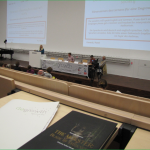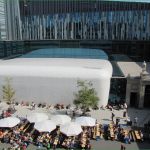At the beginning of September 2014 I participated in the Degrowth 2014 conference. My goal was to find out about the latest developments on the Maker Movement scene in Germany as well as to determine its relation to the degrowth concept. And that goal was achieved. So, here are the most interesting outputs from Degrowth 2014 with regard to open-source eco-innovation and collaborative sustainable development:
 #1. Nowadays the means of manufacturing have become more and more accessible to individuals, meaning that one is potentially less dependent on consuming products from large capitalist companies. If you want a piece of hardware, you can just produce one at home (this approach is called DIY, Do-It-Yourself). And if you cannot do it alone, you can use the collaborative power of the community, both virtual and real, to co-create the thing you need (this is what is called DIT, Do-It-Together). There is an increasing number of co-working spaces and open workshops popping up all around. There you can use the tools and machines available to create individually or with peers the things you need. In this way you produce them locally, thus avoiding transportation of stuff and greenhouse gas (GHG) emissions associated with it. Besides, as you are the one, who created the thing, it is likely that you will put more value on it and therefore will keep and use it as long as possible, minimizing waste in this way.
#1. Nowadays the means of manufacturing have become more and more accessible to individuals, meaning that one is potentially less dependent on consuming products from large capitalist companies. If you want a piece of hardware, you can just produce one at home (this approach is called DIY, Do-It-Yourself). And if you cannot do it alone, you can use the collaborative power of the community, both virtual and real, to co-create the thing you need (this is what is called DIT, Do-It-Together). There is an increasing number of co-working spaces and open workshops popping up all around. There you can use the tools and machines available to create individually or with peers the things you need. In this way you produce them locally, thus avoiding transportation of stuff and greenhouse gas (GHG) emissions associated with it. Besides, as you are the one, who created the thing, it is likely that you will put more value on it and therefore will keep and use it as long as possible, minimizing waste in this way.
#2. However, you may argue that more accessible manufacturing means can lead to more production and consumption, and thus more waste, GHG emissions, and other environmental damage. Indeed, this is a valid point to consider. And the conference provided part of the response for it. Certain open workshops with professional machines, so-called Fab Labs, have started to apply principles of circular / closed-loop flow of materials. This is how the concept of “Green Fab Lab”, an open workshop with complete resource sustainability and zero waste outputs, has been born. And there is technology allowing it to happen already. For instance, with an open-source device called FilaMaker you can shred plastic things and waste from your 3D printer into a new filament input for it. The device is still far from perfect, but you can imagine where this is going. Ideally we would be able to 3D print the things we need and then, at the end of their life cycle, recycle them into material for new things. Furthermore, you can expect no extra waste from this process, as the 3D printer software is already designed to calculate how to print an object with the least amount of material needed.
 #3. Such accessibility of manufacturing means combined with the power of collaboration and sharing allow the appearance of “degrowth businesses” – companies that rely on community engagement, collaboration, and open source rather than closed innovation and profit maximization. An example presented at the Degrowth 2014 conference was Premium Cola. Its business model is based on an open sharing of all product developments and collaborative construction of its business. The company does little marketing, allowing the community members to decide on whether to purchase and promote the product or not. Such businesses are extremely difficult to launch and run, but, as shown by Premium Cola, it is possible. However, they still need to prove whether they really contribute to the “degrowth utopia”.
#3. Such accessibility of manufacturing means combined with the power of collaboration and sharing allow the appearance of “degrowth businesses” – companies that rely on community engagement, collaboration, and open source rather than closed innovation and profit maximization. An example presented at the Degrowth 2014 conference was Premium Cola. Its business model is based on an open sharing of all product developments and collaborative construction of its business. The company does little marketing, allowing the community members to decide on whether to purchase and promote the product or not. Such businesses are extremely difficult to launch and run, but, as shown by Premium Cola, it is possible. However, they still need to prove whether they really contribute to the “degrowth utopia”.
The concept of degrowth and its connection to sustainability and environment protection is still full of knowledge gaps, like Swiss cheese is full of holes. This has been proven by the outcomes of the Degrowth 2014 conference. Still, there is also more and more research in this field happening nowadays. It should help closing the gaps and support the decision-making regarding the concept of degrowth. And I am excited to contribute to this research with my own study of the Maker Movement in Berlin. So, you can expect more interesting posts and articles on this topic coming soon from my side.







